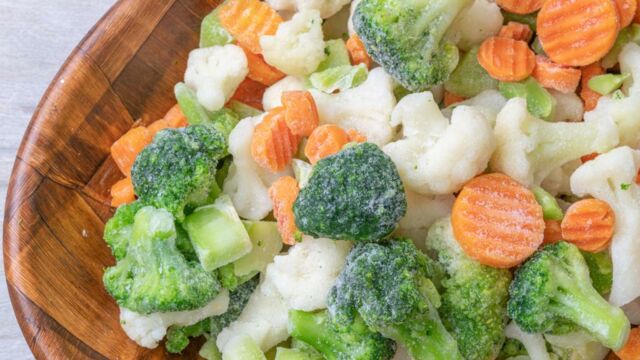Frozen foods are a good way to maintain a balanced diet, and eat vegetables regularly. Whether it’s peas, green beans, carrots, or spinach, frozen vegetables are excellent for your health and retain most of their nutrients. They also prevent waste, since you can make only the amount you need, and save yourself the chore of peeling the vegetables.
Discover our latest podcast
On the other hand, these vegetables can sometimes be too soft, bland, or overcooked if they are not properly prepared. Here are three mistakes to avoid, and our tips on how to enjoy frozen vegetables.
Not adding salt
When cooking frozen vegetables, especially greens, there is a tendency to put them in a pot of boiling water and cook them for ten minutes or more. This is a shame since this slow way of cooking depletes the vegetable of their nutrients. Ideally, use a small amount of water that barely covers the vegetable and a teaspoon of coarse salt. This will allow the vegetables to cook quicker, and therefore boil for less time. They will then be richer in nutrients.
Cooking the vegetables while frozen
For vegetables that are cooked in a frying pan or wok, it is best to let them defrost before cooking. This is because if vegetables are cooked directly from the freezer, they will become watery and soft. The necessary portion should be defrosted 30 minutes to 1 hour before cooking them (or even in the morning if you’re eating them in the evening). Then cook them at the last minute with a little oil or soy sauce for an Asian touch!
When it comes to gratins or quiches, the same applies. It is a good idea to leave the vegetables out before cooking them, to remove any excess water, or even to pre-cook them. This will prevent your dishes from being too watery.
Not refreezing the vegetables
It is always said that you shouldn't refreeze a thawed product, and this is true. On the other hand, cooked frozen vegetables can be refrozen. This is because the cooking process will have eliminated any bacteria present. The vegetable at this point has changed states, from being frozen to cooked, so there is no longer any risk.
Soups, gratins, or quiches can thus all be refrozen without any problems.















